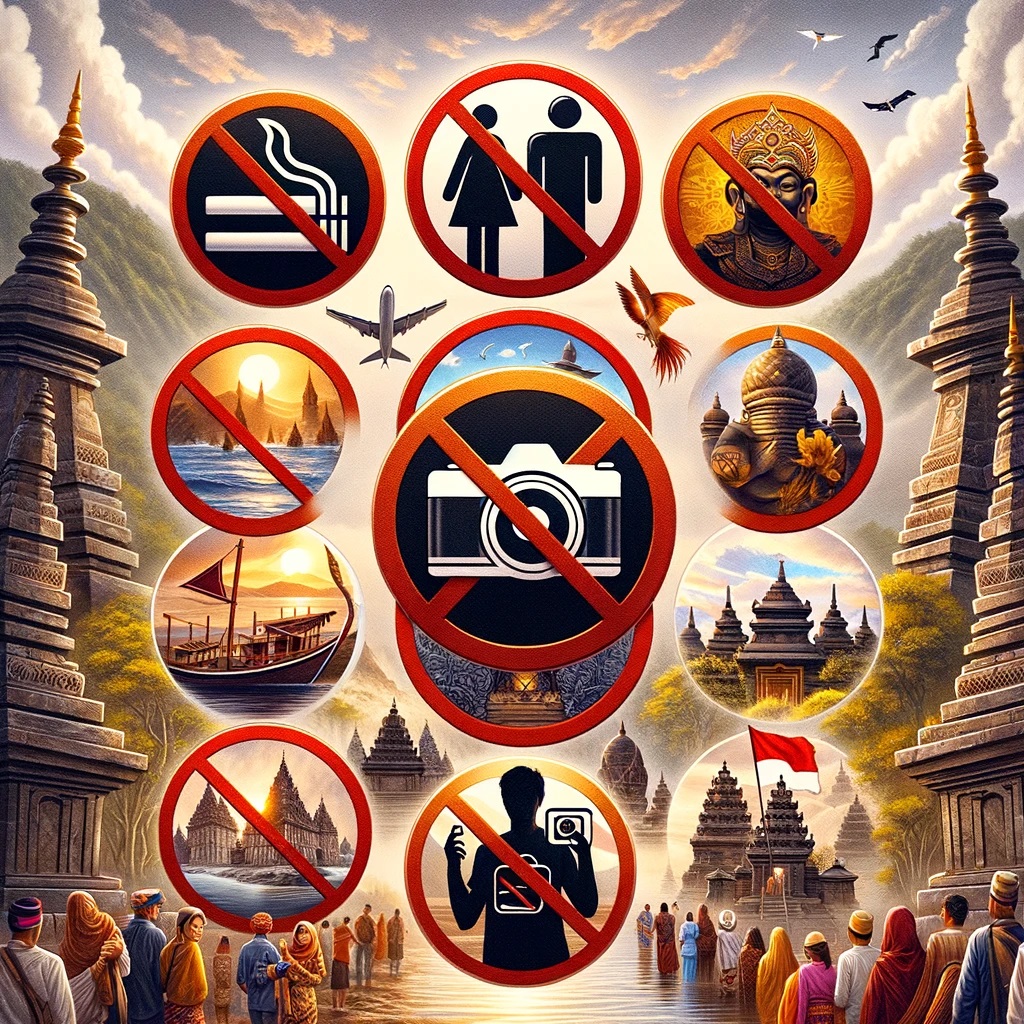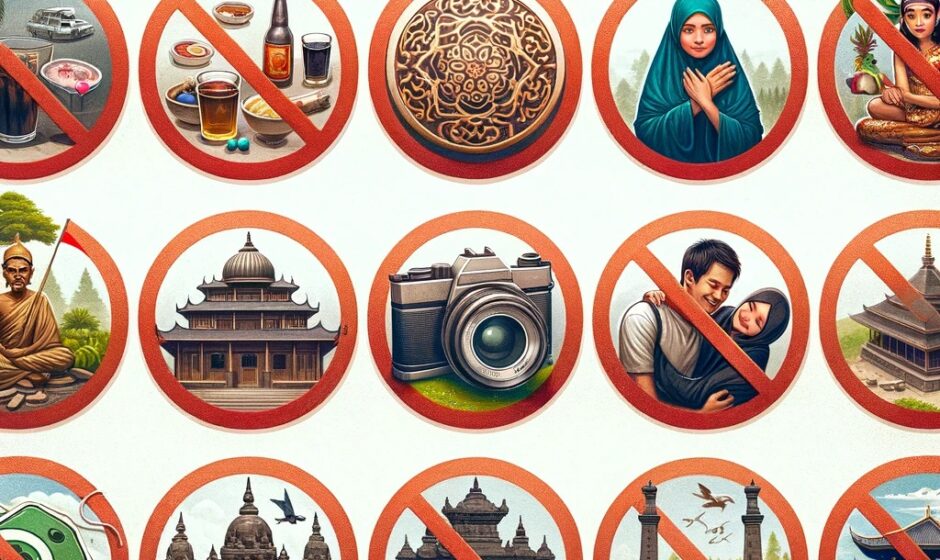“Things prohibited in Indonesia” form an essential checklist for any traveler venturing into this diverse and culturally rich country. Understanding these restrictions not only ensures a respectful visit but also guards against unintended legal issues. Let’s delve into the crucial “What Not to Do in Indonesia” to enhance your travel experience.

Drug Offenses: A Zero-Tolerance Policy
“Things prohibited in Indonesia” prominently feature drug offenses, underscoring the country’s zero-tolerance policy. Crucially, for travelers, grasping this aspect of Indonesian law is essential. Drug offenses are among the most serious legal violations in Indonesia. The country’s stance on drugs is unwavering and stringent, covering possession, use, and trafficking, all carrying severe penalties. Having traveled extensively in Indonesia, I have seen the severity with which authorities enforce these offenses.
Moreover, this zero-tolerance policy is more than a legal technicality; it mirrors a deep-rooted cultural and social opposition to drugs. Consequently, for tourists, even minor offenses could result in significant legal consequences. I vividly remember an incident where a fellow traveler incurred harsh penalties for a minor, unintentional violation. This serves as a stark reminder that being unaware of the law provides no defense.
This stringent policy underscores a vital travel tip: stay clear of any drug-related activities. Indonesia’s enforcement agencies actively work to uphold this law. Avoiding drugs entirely is the safest bet for visitors. This isn’t merely about following rules; it’s about respecting the host country’s laws and values.
Travelers should also be aware of Indonesia’s legal process in drug cases. The judicial system can be daunting, and legal proceedings often lengthy and complex. From personal observations, I’ve seen the challenges non-natives face in such situations. It’s a path best avoided.
Respect Religious Norms
“Respect Religious Norms in Indonesia” is a vital mantra for every traveler exploring this culturally rich country. Indonesia, known for its diverse religious landscape, places high value on religious customs and practices. As a seasoned traveler in Indonesia, I’ve experienced firsthand the importance of respecting these norms. It’s not just about following rules; it’s about showing genuine respect for the local culture.
Dress modestly at religious sites in Indonesia. This shows respect for local traditions. Proper attire at Indonesian temples and mosques creates respect and belonging. Consideration in dress has a significant impact.
Awareness of religious observances like Ramadan is crucial. Avoid eating and drinking in public during fasting hours. This respects those fasting and demonstrates empathy. Such understanding deepens connections with local communities.
Seek permission before photographing religious sites or ceremonies. This respects their privacy and sacredness. Asking permission is respectful and can lead to enriching interactions with locals. Remember, these are key aspects of “things prohibited in Indonesia”
Moreover, always seek permission before photographing religious sites or ceremonies. Respecting privacy and sacredness is key. I’ve learned that asking for permission not only shows respect but often leads to enriching interactions with locals
Public Displays of Affection: Keep it Private
In Indonesia, “Public Displays of Affection” is a crucial norm to understand, especially for visitors. This guideline aligns with the broader “things prohibited in Indonesia” and “What Not to Do in Indonesia”. Indonesia, with its rich cultural tapestry, often views public displays of affection (PDA) as inappropriate. As a traveler who respects local customs, I’ve learned the importance of this cultural norm.
Public displays of affection, such as kissing or hugging, may be frowned upon in conservative areas in Indonesia. Respecting local customs goes beyond rule-following; it’s about understanding and valuing cultural sensitivities. Discretion in public spaces is highly valued and demonstrates cultural awareness.
Indonesian society places importance on modesty and discretion in public interactions. Following this norm is essential for a respectful visit. Avoiding public displays of affection blends you into local culture and prevents unwanted attention or discomfort, showing respect for local customs and practices.
Understanding this cultural aspect enhances your experience in Indonesia, demonstrating appreciation for the country’s social norms. Embracing the norm of keeping public displays of affection private is vital for a respectful and immersive travel experience in Indonesia, reflecting mindfulness and consideration for the cultural environment.
Photography Restrictions: Seek Permission
This rule is part of the broader “Photography Restrictions in Indonesia,” crucial for travelers. Indonesia’s landscapes and cultural richness make it a haven for photographers. Respecting local photography laws and norms remains vital. As a seasoned traveler and photographer in Indonesia, understanding these rules is key.
Photography is restricted in certain areas in Indonesia, including government buildings, military facilities, and some cultural sites. Always seek permission before taking photos in these sensitive locations. Such respect upholds local laws and acknowledges privacy and security concerns.
Not all public spaces in Indonesia allow photography. Respecting people’s privacy is essential. Consent is necessary before photographing individuals, especially in rural or traditional communities. This respect for personal space and privacy garners appreciation from locals and leads to more authentic, respectful interactions.
Photography in religious sites requires special attention. Always ensure you have permission, and be mindful of the sanctity of these spaces. Capturing images in these areas without consent can be seen as intrusive and disrespectful.
Gambling: Not Worth the Risk
Understanding “Gambling in Indonesia” is crucial for anyone visiting or residing in the country. Indonesia enforces a strict no-gambling policy, making it a key point under “things prohibited in Indonesia”. As an experienced traveler and cultural observer, I’ve seen how seriously this law is taken. In Indonesia, all forms of gambling are illegal. This includes casinos, betting shops, and even informal betting in private settings.
The Indonesian government’s stance on gambling is clear and unwavering. They aim to protect societal values and prevent the negative impacts of gambling. Tourists and expatriates must be particularly cautious. Unawareness of the law is not a defense, and penalties can be severe.
During my travels in Indonesia, I’ve witnessed the strict enforcement of these laws. Police raids on illegal gambling operations are common. It’s not worth the risk to engage in any gambling activities.
Even online gambling falls under this prohibition. The government actively blocks access to online gambling websites. Using VPNs to access these sites can lead to legal troubles.
Alcohol Consumption: Know the Limits
Navigating “Alcohol Consumption in Indonesia” requires understanding and respecting the country’s unique cultural and legal landscape. Indonesia presents a varied approach to alcohol, making it a significant topic under the broader scope of “things to be aware of in Indonesia”. As an experienced traveler familiar with Indonesia’s customs, I’ve seen diverse attitudes towards alcohol across regions.
In predominantly Muslim areas, alcohol consumption is often viewed unfavorably due to religious beliefs. Being culturally sensitive in these regions is crucial. It means consuming alcohol discreetly and respecting local sentiments. Tourist-heavy areas like Bali or Jakarta, however, exhibit more liberal attitudes towards alcohol. Here, bars and clubs serve alcohol openly.
Yet, it’s important to note that certain provinces in Indonesia have strict alcohol laws. For instance, Aceh completely bans alcohol. Tourists should research local laws in specific destinations to avoid legal issues. I’ve learned that understanding regional differences is key to a respectful and enjoyable experience.
Furthermore, Indonesia has regulations regarding the sale and consumption of alcohol. There are age restrictions, and alcohol availability might vary. It’s essential to adhere to these rules to ensure a hassle-free visit.
Homosexuality: A Sensitive Subject
Understanding the landscape of “Homosexuality in Indonesia” is essential for both visitors and locals. In Indonesia, the perception and legal status of homosexuality are complex and varied. This topic falls under sensitive and crucial aspects of “things to be aware of in Indonesia”. As someone who has explored diverse cultural settings, I’ve observed that attitudes towards homosexuality in Indonesia are not uniform.
In some regions, there is a more open acceptance of the LGBTQ+ community. Places like Bali, known for their tourist-friendly environment, tend to be more liberal. In many parts of Indonesia, conservative views, shaped by cultural and religious norms, are dominant. Public displays of same-sex affection are generally frowned upon, often attracting unwanted attention.
The legal situation regarding homosexuality in Indonesia varies. Homosexuality is not explicitly illegal in most of the country, but there are no laws to protect against discrimination. Certain regions like Aceh enforce strict laws against same-sex relationships. It’s crucial for LGBTQ+ travelers to be aware of these regional differences.
Navigating this terrain requires sensitivity and awareness. Respecting local customs and laws while being aware of one’s own safety is important. As a traveler, understanding these nuances has helped me appreciate the diverse perspectives within Indonesia.
“Things prohibited in Indonesia” reflect the nation’s unique cultural and legal landscape. Understanding these rules is crucial for a respectful and enjoyable visit. Remember, your actions impact not just your experience but also local perceptions of tourists. Avoid drug offenses, respect religious norms, and be mindful of public affection displays. Be cautious with photography, steer clear of gambling, and contribute to environmental care by not littering. Understand alcohol consumption regulations, honor cultural heritage by not removing artifacts, and avoid politically sensitive discussions. Homosexuality, a delicate topic, requires awareness of local attitudes. This knowledge equips you to navigate Indonesia’s rich cultural tapestry with respect and ease. As you immerse yourself in Indonesia’s wonders, remember these guidelines. These guidelines guarantee a journey that is memorable and culturally sensitive. Embrace Indonesia’s diversity with awareness and respect. This approach enriches and harmonizes your travel experience.


